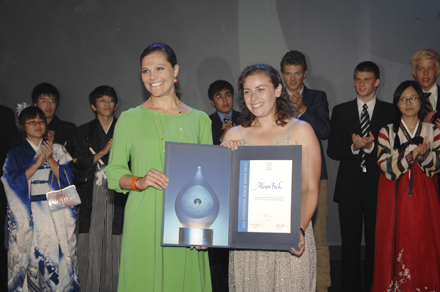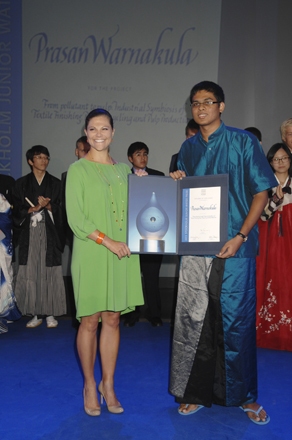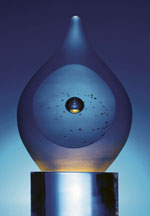Navigation
Mobile Phone Innovation to Test Water Quality Wins Stockholm Junior Water Prize
Alison Bick has developed a low-cost portable method to test water quality using a mobile phone.
 |
| H.R.H. Crown Princess Victoria of Sweden, the Patron of the Stockholm Junior Water Prize, presents the award to Stockholm Junior Water Prize winner Alison Bick at a ceremony that took place during the World Water Week in Stockholm. Photograph by Cecilia Österberg, Exray |
Alison Bick has developed a low-cost portable method to test water quality using a mobile phone. Alison, a teenager from the USA, is the winner of the 2011 Stockholm Junior Water Prize. H.R.H. Crown Princess Victoria of Sweden presented her award at a ceremony that took place during the World Water Week in Stockholm.
Alison worked for four years on her project, which combines micro-fluidic devices, cell-phones, and chemical indicators to evaluate water quality. Her innovative method does not only accurately assess the bacteria content of water. It is both significantly faster and up to 200 times less expensive than standard testing procedures.
Development and Evaluation of a Microfluidic Co-Flow Device to Determine Water Quality
By Alison Bick
By combining co-flow microfluidic devices, cell-phones, and the indicator chemical Colilert-18, a novel way of determining water qualities was found. The cell-phone takes an image of the channel and analyses it. A statistically significant positive correlation between bacteria concentration and yellow pixel intensity in the images were identified. In comparison, the new device is 18 hours faster, 200 times less expensive, and as accurate as the standard bacteria tests.
"This year’s winning project reflects truly out of the box thinking to find a solution to an important real world problem that is relevant in both a developing and developed country context. It is the result of a creative, multi-facetted, and long-term effort that was triggered by an actual problem in the local community. It has the potential to revolutionize our ability to monitor water quality in a way that is fast, accurate, more flexible and less expensive than existing technologies,” said the International Jury in its citation.
“I thought it was absolutely fascinating to speak to all the different contestants from all the different nations and cultures. It was something I’ve never experienced before. I am really excited to win such a prestigious contest. Hopefully I’ll keep in contact with the other contestants and hopefully collaborate one day,” said the winner after receiving the prize.
 |
| H.R.H. Crown Princess Victoria of Sweden, the Patron of the Stockholm Junior Water Prize, presents a Diploma of Excellence to Prasan Warnakula at a ceremony that took place during the World Water Week in Stockholm. Photograph by Cecilia Österberg, Exray |
Excellence Diploma to Sri Lanka
A Diploma of Excellence was given to Prasan Warnakula from Sri Lanka for his project “From pollutant to pulp: industrial symbiosis of textile finishing, paper recycling and pulp production.”
From pollutant to pulp: Industrial Symbiosis of Textile Finishing, Paper Recycling and Pulp Production
By: Prasan Warnakula
The objective of this research was to investigate the possibility of making paper pulp out of low grade recycled paper. The young Sri Lankan scientist found that some nutrients from wastewater from the textile finishing industry could enable a symbiotic process. Aluminum, which needs to be removed from the industrial wastewater, can be absorbed in paper pulp, to improve its stability. Following a series of experiments and trials, the project indicates that it is possible to reduce the water requirement for pulp production and improve the treatment efficiency of the textile industry wastewater.
The international Jury said, “This year’s diploma of excellence is awarded to a project that reflects a refreshing new way of systems thinking that is highly needed for future sustainability. The jury was very impressed by the independent nature of the investigation and especially the innovative approach to conducting the experiments using equipment adapted from items readily available in the home environment. The principle of this detailed project is inspired by nature and will soon be applied in a much larger context: a real world example of industrial symbiosis in a developing country.”
The international Stockholm Junior Water Prize competition brings together thousands of participants in over 28 countries. The representatives at the international final held during the World Water Week in Stockholm are the winners of national competitions that fielded over 9000 submitted projects this past year.
 |
| Stockholm Junior Water Prize winner receives a USD 5,000 award and a prize sculpture. Photograph courtesy of SIWI |
The international winner receives a USD 5,000 award and a prize sculpture. The Stockholm International Water Institute administers the competition, which is sponsored globally by ITT Corporation.
“ITT is proud to support the Stockholm Junior Water Prize and the outstanding water research the competition generates,” said Gretchen McClain, senior vice president at ITT and president of its Fluid and Motion Control group. “Every year we are inspired by the groundbreaking work of students across the world and their commitment to finding new and innovative solutions our global water challenges. We congratulate this year’s winner and of all the participants for continuing their efforts to help solve our global water issues.”
About the Stockholm Junior Water Prize
The competition is open to young people between 15-20 years of age, who have conducted water-related projects focusing on local, regional, national or global topics of environmental, scientific, social or technological importance. As a result of the competitions, thousands of young people around the world develop personal interests, undertake academic study, and often pursue careers in the water or environmental fields. H.R.H. Crown Princess Victoria of Sweden is the Patron of the Stockholm Junior Water Prize. The winner receives an award of USD 5,000 and a handmade blue crystal sculpture. The Stockholm International Water Institute administers the competition, which is sponsored globally by ITT Corporation. The official suppliers for the competition are Infobahn, Halebop, Hertz, People Travel Group and Trosa Tryckeri.
This year, the International Jury chose to award a project with a Diploma of Excellence. The recipient received a 500 USD award.
The International Jury includes experts within the field of water who, by committee consensus, appoint the winner of the international final. The decision is based on the written report, a short presentation of the display material and interviews with the finalists. The Stockholm Water Foundation Board appoints the Jury members.
The 2011 International Jury members are: Dr. Fredrik Moberg, (Chair), Sweden; Mr. Bjorn von Euler, USA; Ms. Charlotte de Fraiture, Ghana; Ms. Eileen O´Neill, USA; Dr. Piet Lens, Netherlands; Ms. Susana Sandoz, Bolivia; Mr. Alex Simalabwi, Sweden and Ms. Helene Brinkenfeldt (Secretary), SIWI, Sweden.
For more information please visit: www.siwi.org/prizes
About the World Water Week in Stockholm
The World Water Week in Stockholm is the annual meeting place for the planet’s most urgent water-related issues. Organized by the Stockholm International Water Institute (SIWI), it brings together 2,500 experts, practitioners, decision makers and business innovators from around the globe to exchange ideas, foster new thinking and develop solutions.
About Stockholm International Water Institute
The Stockholm International Water Institute (SIWI) is a policy institute that contributes to international efforts to combat the world's escalating water crisis. SIWI develops and promotes future-oriented and knowledge–integrated policies, towards sustainable use of the world’s water resources leading to sustainable development and poverty eradication.
This news is from World Water Week, Stockholm, Sweden, 23rd August 2011.
Search
Latest articles
Agriculture
- World Water Week: Healthy ecosystems essential to human health: from coronavirus to malnutrition Online session Wednesday 24 August 17:00-18:20
- World Water Week: Healthy ecosystems essential to human health: from coronavirus to malnutrition Online session Wednesday 24 August 17:00-18:20
Air Pollution
- "Water and Sanitation-Related Diseases and the Changing Environment: Challenges, Interventions, and Preventive Measures" Volume 2 Is Now Available
- Global Innovation Exchange Co-Created by Horizon International, USAID, Bill and Melinda Gates Foundation and Others
Biodiversity
- It is time for international mobilization against climate change
- World Water Week: Healthy ecosystems essential to human health: from coronavirus to malnutrition Online session Wednesday 24 August 17:00-18:20
Desertification
- World Water Week: Healthy ecosystems essential to human health: from coronavirus to malnutrition Online session Wednesday 24 August 17:00-18:20
- UN Food Systems Summit Receives Over 1,200 Ideas to Help Meet Sustainable Development Goals
Endangered Species
- Mangrove Action Project Collaborates to Restore and Preserve Mangrove Ecosystems
- Coral Research in Palau offers a “Glimmer of Hope”
Energy
- Global Innovation Exchange Co-Created by Horizon International, USAID, Bill and Melinda Gates Foundation and Others
- Wildlife Preservation in Southeast Nova Scotia
Exhibits
- Global Innovation Exchange Co-Created by Horizon International, USAID, Bill and Melinda Gates Foundation and Others
- Coral Reefs
Forests
- NASA Satellites Reveal Major Shifts in Global Freshwater Updated June 2020
- Global Innovation Exchange Co-Created by Horizon International, USAID, Bill and Melinda Gates Foundation and Others
Global Climate Change
- It is time for international mobilization against climate change
- It is time for international mobilization against climate change
Global Health
- World Water Week: Healthy ecosystems essential to human health: from coronavirus to malnutrition Online session Wednesday 24 August 17:00-18:20
- More than 400 schoolgirls, family and teachers rescued from Afghanistan by small coalition
Industry
- "Water and Sanitation-Related Diseases and the Changing Environment: Challenges, Interventions, and Preventive Measures" Volume 2 Is Now Available
- Global Innovation Exchange Co-Created by Horizon International, USAID, Bill and Melinda Gates Foundation and Others
Natural Disaster Relief
- STOP ATTACKS ON HEALTH CARE IN UKRAINE
- Global Innovation Exchange Co-Created by Horizon International, USAID, Bill and Melinda Gates Foundation and Others
News and Special Reports
- World Water Week: Healthy ecosystems essential to human health: from coronavirus to malnutrition Online session Wednesday 24 August 17:00-18:20
- STOP ATTACKS ON HEALTH CARE IN UKRAINE
Oceans, Coral Reefs
- World Water Week: Healthy ecosystems essential to human health: from coronavirus to malnutrition Online session Wednesday 24 August 17:00-18:20
- Mangrove Action Project Collaborates to Restore and Preserve Mangrove Ecosystems
Pollution
- Zakaria Ouedraogo of Burkina Faso Produces Film “Nzoue Fiyen: Water Not Drinkable”
- "Water and Sanitation-Related Diseases and the Changing Environment: Challenges, Interventions, and Preventive Measures" Volume 2 Is Now Available
Population
- "Water and Sanitation-Related Diseases and the Changing Environment: Challenges, Interventions, and Preventive Measures" Volume 2 Is Now Available
- "Water and Sanitation-Related Diseases and the Changing Environment: Challenges, Interventions, and Preventive Measures" Volume 2 Is Now Available
Public Health
- Honouring the visionary behind India’s sanitation revolution
- Honouring the visionary behind India’s sanitation revolution
Rivers
- World Water Week: Healthy ecosystems essential to human health: from coronavirus to malnutrition Online session Wednesday 24 August 17:00-18:20
- Mangrove Action Project Collaborates to Restore and Preserve Mangrove Ecosystems
Sanitation
- Honouring the visionary behind India’s sanitation revolution
- Honouring the visionary behind India’s sanitation revolution
Toxic Chemicals
- "Water and Sanitation-Related Diseases and the Changing Environment: Challenges, Interventions, and Preventive Measures" Volume 2 Is Now Available
- Actions to Prevent Polluted Drinking Water in the United States
Transportation
- "Water and Sanitation-Related Diseases and the Changing Environment: Challenges, Interventions, and Preventive Measures" Volume 2 Is Now Available
- Urbanization Provides Opportunities for Transition to a Green Economy, Says New Report
Waste Management
- Honouring the visionary behind India’s sanitation revolution
- Honouring the visionary behind India’s sanitation revolution
Water
- Honouring the visionary behind India’s sanitation revolution
- Honouring the visionary behind India’s sanitation revolution
Water and Sanitation
- Honouring the visionary behind India’s sanitation revolution
- Honouring the visionary behind India’s sanitation revolution

